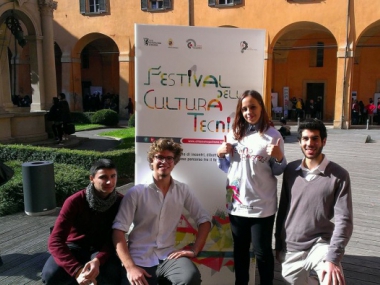THE RELAUNCH OF TECHNICAL EDUCATION IN BOLOGNA
Edited on
12 January 2018Starting from 2013, as part of the Metropolitan Strategic Plan, a set of projects to revitalize the metropolitan area from the economic, social and cultural point of view were activated.

Among them, it has been identified as a priority the project "The relaunch of technical education", which aims to qualify technical schools and to provide correct information about them, from the upper secondary/high school level (with reference to the technological sector but also to the economic and “services for enterprises” sector), and more generally to enhance the "technical culture"- understood primarily as the connection between doing and thinking, and the ability to master even creatively technical processes - as a fundamental competence of citizenship.
The project “The relaunch of technical education” fits into the broader strategy “The Manufacturing Renaissance", which aims to give new vigour, also considering technological and ICT innovation, to the bolognese tradition in mechanics, mechatronics and automation.
The project was activated in September 2013, and it is thus the third year of implementation. It is coordinated by the Metropolitan City and conducted jointly by an inter-institutional public-private partnership consisting of: AsaBo (Association of Autonomous Schools of Bologna); Aster; Bologna Chamber of Commerce; CNA Bologna; Municipality of Bologna; ITS Maker Foundation; Emilia-Romagna Region; Regional and Local Education Public Department; Unindustria Bologna; schools involved in the project.
The project started with 9 Institutes of the manufacturing area (mechanics, electronics, ICT, chemistry, graphics, logistics, fashion), very different in geographic location, size, kind of students, study courses, degree of innovation, relations systems.
These Institutes formed a network and made an analysis of their educational service, identifying 4 main areas of intervention:
-incoming guidance in connection with lower secondary schools, and welcome programs in early grades;
-partnership with companies;
-curricular, methodological and organizational innovation;
-network activities between institutes.
With reference to these fields, through joint working teams the 9 Institutes have come to define many improvements, which started concretely in schools from September 2014. We remember some:
-”open days” in technical institutes for lower secondary school teachers;
-promotion of technical culture in the three years of lower secondary school, with interventions and workshops conducted by upper secondary students;
-production of facsimiles of conventions and standard procedures for the stabilization of multi-year partnerships with companies;
-dissemination of repertoires of possible integrated activities for alternating school-work, and technical assistance for their implementation;
-implementation of digital platforms for cooperative learning between institutes (of different fields and territories) and companies;
-realization of seminars in companies for educators (school principals, teachers, trainers, counsellors);
-experimental curriculum integrations aimed at additional diplomas in technical (eg. "Frigotronica" in the Belluzzi-Carpigiani partnership);
-activation of a “Technoragazze desk” in each Institute, managed by female teachers of technical subjects and addressed to female students or young girls interested in enrolling in technical schools.
Starting from spring 2015, the project was extended formally to the institutes of the economic sector (accounting, finance, marketing, business information systems, international relations, tourism) and, from September 2015, to food, agroindustry, buildings, environment, territory courses.
Simultaneously with the qualification paths, the project partners have invested in the public promotion of technical education and culture.
Thus was born the "Technical Culture Festival", calendar of events taking place, from 2014, between October and December.
In these two editions (this year ended on December 14th), the Festival has included:
-an opening day with public exhibition of products/prototypes made by technical schools in collaboration with companies, and presented directly by students;
-thematic seminars;
-a meeting, promoted by Aster, designed to connect schools with industrial research laboratories and companies with strong innovative approaches;
-meetings/workshops about technical culture aimed at different audiences including children, teens, families, students, teachers;
-conferences/meetings of partner organizations to delineate the tasks for the following year.
To date, the project involves about 60 organizations, including 22 technical and vocational schools and 21 lower secondary schools.
Around the project, to strengthen the visibility and to promote an increasing involvement on these themes, a “Metropolitan Network for the development of technical culture” has been formed, joint to date by 101 organizations of education, training, work and public administration fields.
The Network members: receive a regular Newsletter containing information about technical culture initiatives promoted within the Metropolitan Strategic Plan of Bologna; receive specific news about events, seminars, educational opportunities, working groups; can access a desk for information and support; can promote through the Network the technical culture initiatives undertaken by their organizations; can express needs for information, training, assistance, that are taken into account in the development of interventions whenever possible.
The project has been financed, from 2013 to date, by the European Social Fund, by the Bologna Chamber of Commerce, by the Metropolitan City of Bologna and, for specific actions, by the Union of Italian Provinces/National Agency for Youth (Be@ctive program) and by the Leonardo/TOI 2013 European program.
 Submitted by Karolina Prymas on
Submitted by Karolina Prymas on
